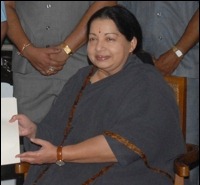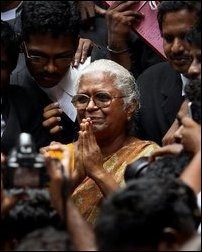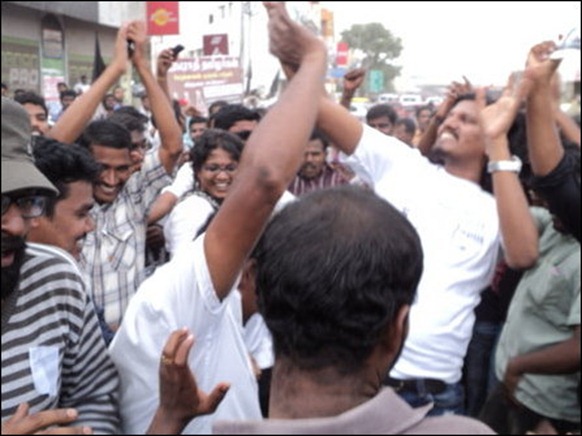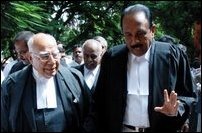 In an extraordinary development in Indian constitutional history, the Tamil Nadu State Assembly on Tuesday unanimously and strongly resolved that the President of India, respecting the sentiments of the people and political parties of Tamil Nadu, should reconsider the clemency appeals of the three Tamils fixed for execution and convert their death sentences into life imprisonment. In the meantime, acting on a legal move by Vaiko and N. Chandrasekaran, The Madras High Court on Tuesday stayed the executions for 8 weeks giving time for the government to file counter affidavit. The President of India earlier rejected the clemency appeals of Perarivalan of Tamil Nadu and two Eezham Tamils, Murugan and Shanthan condemned to death in the Rajiv Gandhi assassination case, and their hangings were fixed to September 09.
In an extraordinary development in Indian constitutional history, the Tamil Nadu State Assembly on Tuesday unanimously and strongly resolved that the President of India, respecting the sentiments of the people and political parties of Tamil Nadu, should reconsider the clemency appeals of the three Tamils fixed for execution and convert their death sentences into life imprisonment. In the meantime, acting on a legal move by Vaiko and N. Chandrasekaran, The Madras High Court on Tuesday stayed the executions for 8 weeks giving time for the government to file counter affidavit. The President of India earlier rejected the clemency appeals of Perarivalan of Tamil Nadu and two Eezham Tamils, Murugan and Shanthan condemned to death in the Rajiv Gandhi assassination case, and their hangings were fixed to September 09.
The following were observations of TamilNet political commentator in Colombo:
The President of India has only nominal powers in the Indian constitution and acts always on the advice of the Central Government of India.
 Once the President of India rejects the clemency appeal (for all practical purposes on the advice of the Central Government), no further appeal could be made to anybody else except to the President. Once the date for the hanging is fixed only the emergence of any fresh evidence could stop it.
Once the President of India rejects the clemency appeal (for all practical purposes on the advice of the Central Government), no further appeal could be made to anybody else except to the President. Once the date for the hanging is fixed only the emergence of any fresh evidence could stop it.
An argument raised in the Indian media was whether it is justifiable to execute the hanging after keeping the condemned for more than 20 years in prison (a term meant for life imprisonment).
pdf: TN Assembly Resolution tabled by Ms. Jayalalithaa on Tuesday
The most important political and constitutional question to the federalism of India is whether a State has a say or not in an extraordinary situation when an act of the President of India, on the advice of the Central Government of India, endangers peace in that State.
Politically the case under question is inseparably entwined with India-involved 30 years- war in the island of Sri Lanka that turned into genocide of Eezham Tamils.
Investigation of crimes involved with the war is now a matter of international concern.
The thirty years war associated with the case has taken the lives of an estimated 200,000 Eezham Tamil civilians and comparatively a negligible number of Sinhala and Muslim civilians in the island, apart from fallen combatants on all sides. But the genocidal war has neither seen a political solution nor a trial of those who had the command responsibility.
The way New Delhi was acting over the decades, a situation is fast developing where the people of Tamil Nadu have started considering justice to the Eezham genocide as a personal issue of theirs. Imperceptibly they have taken the onus of voicing for the silenced masses of Eezham Tamils.
When such is the situation any democratically elected State government in Tamil Nadu, respecting the sentiments of its people and in the interests of its people, may have to at least voice if not act on matters that get into external affairs of India.
The Tamil Nadu government led by Ms Jayalalitha has taken the bold steps in the right direction by resolving in the Assembly on the execution cases and on the investigation of Sri Lanka’s war crimes.
It is highly appreciable that these resolutions are passed unanimously in the Assembly.
The Tamil Nadu State is in a unique position in India due to a geopolitical situation arising from the war and international involvement in the island of Sri Lanka.
People and political parties of Tamil Nadu have to carefully understand the unique situation and should work in unison.
The other States in India should extend their fullest support to Tamil Nadu in evolving right norms of democracy in the federalism of India.
The grass-root of Tamil Nadu taking up the struggle, on behalf of Eezham Tamils, should be eye-opening to the ‘elite’ in the diaspora on what could really be achieved by the power of people in South Asia.
The elite among Tamil Nadu, Sinhalese, Eezham Tamils and among the Diaspora should take into consideration the developments that come from the grass-root of Tamil Nadu, and it is hoped that the Sinhalese grass-root would also join it.
[Story continues after photo]

The site where three female lawyers concluded their fast, celebrating the victory following the stay order by the High Court in Madras.
* * *
Meanwhile, Indian Law Minister Salman Khurshid said that the resolution passed by the Tamil Nadu State Assembly was “not binding on anybody.”
“High courts and the Supreme Court can take their own view. I cannot comment on any view they have taken particularly till the view becomes final. It is an interim order which they have passed and I am sure the government will respond to it,” The Hindu reported Mr. Khurshid as saying.
Janata Party president Subramanium Swamy, an anti Eezham politician, demanded the Indian Prime Minister to get the Supreme Court of Indian to move against the High Court decision in Madras. A furious Vaiko confronted Mr. Swamy in an IBN Live programme.
* * *
“Murukan, Saanthan, Peara’rivaa’lan, engka’l raththam, engka’l raththam,” [Murugan, Shanthan, Perarivalan are our blood, our blood] people began shouting in joy outside Madras High Court Tuesday when the legal move by Tamil activists and MDMK General Secretary Vaiko, succeeded in securing staying order for 8 weeks. Pazha Nedumaran of Tamil Protection Movement and Seeman of Naam Thamizhar were among those who were present with the gathering outside the High Court.
“The Centre and the Tamil Nadu government will file a counter affidavit in the case within eight weeks”, IBN reported citing the two judge bench of justices C Nagappan and M Sathayanarayanan.
 The resolution proposed by Ms. Jayalalithaa and passed in the State Assembly, urged the Indian President to respect the feelings of Tamil Nadu people and the political parties in the State and to reconsider the clemency petition and commute the death sentence of Mr. Suthenthiraraja alias Shanthan, Sriharan alias Murugan and Perarivalan alias Arivu, to life sentence.
The resolution proposed by Ms. Jayalalithaa and passed in the State Assembly, urged the Indian President to respect the feelings of Tamil Nadu people and the political parties in the State and to reconsider the clemency petition and commute the death sentence of Mr. Suthenthiraraja alias Shanthan, Sriharan alias Murugan and Perarivalan alias Arivu, to life sentence.
On Monday, citing a protocol by the Centre, she had stated to the Assembly that in her capacity as the Chief Minister she could not over-rule a decision taken by the Indian President contradicting the Indian Constitution.
MDMK leader Vaiko in a special statement thanked the Chief Minister for the resolution stating that it was a historic event, giving inspiration and guidance to the other States and Centre in India. The event without precedence in the Indian history, would remain at the highest esteem in the Tamil psyche forever, he said.
Earlier, when he emerged from the High Court in Madras, where he appeared as lawyer, Vaiko said: “We are grateful to the Judiciary, we are grateful to Lawyer Ram Jethmalani.” The petition on behalf of the three victims had been filed by him and advocate N. Chandrasekaran. Senior Counsel Ram Jethmalani, appeared for Murugan and Shanthan on the request by Vaiko and Colin Gonsalves appeared for Perarivalan.
Mr. Vaiko also urged the Judges to end the pre-execution isolation of the condemned and restoring open access to them. The Court ordered to end their isolation.
"It takes just 30 seconds to take a man from his cell and pronounce him dead. Imagine a 11-year wait," Hindustan Times reported Ram Jethmalani as telling the Courts.
Noting that the Indian President rejected the mercy petition after 11 years and four months, Mr. Jethmalani argued that the delay in addressing the petition is ‘prima facie wrong’ and that a notice seeking explanation should be sent. After the delay, the death sentence is both illegal and unconstitutional, he argued.
* * *
The developments on Tuesday have come in the wake of the tragic self-immolation by a 21-year-old lady and social activist, Chengkodi in Kaagnchipuram, sacrificing her life for the release of the three sentenced to death.
People thronged to the casket procession of Chengkodi to pay their last respects in massive number in a way never seen before in Kaagnchipuram, media reports said.
Chengkodi, who lost her mother and abandoned by her father when she was a child has become an artist at Makka’l Man’ram, a drama and civil forum. She has been spearheading social activism of the forum through her plays during the last 8 years and has become a skilled artist in the performance of the traditional Tamil percussion instrument Pa’rai.
The cremation of Chengkodi, scheduled to take place at her native village Mangkal-paadi on Tuesday was postponed to Wednesday.
Had the action come a few days ago in the Assembly, a precious activist with the potentiality of becoming a future leader, would have been saved, Tamil activists in Kaagnchipuram said.
Chengkodi belongs to the tribe of Iru’lar, an aborigine community of Tamils akin to the Veddahs who are aborigines of the island of Sri Lanka.
* * *
In the meantime, three female lawyers who had launched a fast-unto-death campaign concluded their fast as the gathering outside the High Court reached the venue of the fast in a joyful march.
The day was observed as a victory day when the legal activists ended their fast. Vaiko, Pazha Nedumaran, Nallakannu (CPI), Velmurugan (PMK), Vanni Arasu (VCK), Artist Trotsky Marudu, Actors Cheran, Ameer, Neethu Chandra, Directors Manivannan and Jananathan participated in the conclusion of the fast.
* * *
Diaspora Tamils in UK staged a protest outside the Indian High Commission from 3:00 p.m. to 7:00 p.m. on Tuesday. Hundreds of participants took part in the protest calling for the abolition of death penalty. The participants paid their respects to Chengkodi. Murukan’s sister handed over an appeal to the officials at the High Commission.
(For updates you can share with your friends, follow TNN on Facebook and Twitter )
